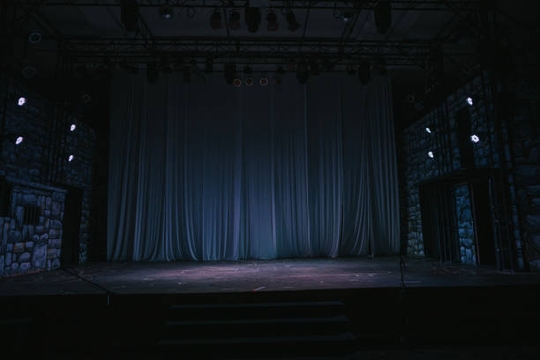Comedy of Errors: Work and Organising in a Theatre
by
Jez
August 22, 2025
Featured in Dispassions: Class Struggle in Arts & Culture (#24)
Work, precarity and performance in the theatre sector

inquiry
Comedy of Errors: Work and Organising in a Theatre
by
Jez
/
Aug. 22, 2025
in
Dispassions: Class Struggle in Arts & Culture
(#24)
Work, precarity and performance in the theatre sector
The life of a working actor is one of absolute precarity. You are always searching for the next job, normally before your current one even ends. To survive in between roles, you have to take on poorly paid and unstable contracts, usually within the very same institutions that you are striving to perform within. To take on full-time contracts, or apply for better paid and secure jobs, would mean to abandon the flexibility that is necessary to find acting work. The hours of auditions, rehearsals and tours cannot co-exist with the time commitment of a permanent role. This is the cycle of instability which traps us in the profession. While many actors in film can rely on the money earned from a performance to sustain them until the next role, wages in the theatre world are rarely high enough that you don’t have to take on additional work and gig jobs between roles. This, as a result, means there is always a large pool of aspiring actors to be employed quickly and cheaply across theatre and arts institutions.
What I document below is not unique to me, and not just within the theatre I currently work at, but for basically all stage actors - even those working at prestigious institutions like the National Theatre - who aren’t relying on a trust fund to see them through. It often feels like the workplace is made actively hostile for some staff, to keep a constant flow of new workers - those who remember better conditions are forced out, and a shared memory is destroyed.
Acting is one of my favourite ways of spending my time, but the lifestyle that currently comes with it, is not. The life of a stage actor has not always been like this, however. Historically, actors have had greater control, greater stability and say over their work and labour. In the 17th century, actors were part of a company, and often shareholders in the business itself - in modern terms, this means they had a full-time contract, stable incomes, and even extra payment if their shows were popular. They also had a say in the writing being performed, how it was being performed, and what the production money should be spent on. This is not to glorify the past - there were often terrible conditions and powerful, exploitative dynamics at play between patrons and actors - but rather to point toward the fact that the work of acting has been organised differently, and it could be in the future.
Current work
I’m currently employed by a major theatre, one that makes much of its history and its lineage, and one that was actually founded by an avowed, and surveilled, communist - a deep but appropriate irony given what it’s like to work there. The hierarchy and structure of my workplace is likely familiar to anyone who works in large cultural institutions, with divisions not only around race, gender, sexuality and class-background, but also between those pursuing ‘creative’ work and those who are simply there to work and get by.
There are workers employed to clean, maintain and do security for the site, and they are almost entirely people of colour, often migrants, and in their middle ages. They are outsourced workers from external companies, kept apart from the rest of the staff and the functioning of the theatre as a whole. There are front-of-house staff and guides - usually young, students or just graduated - who are usually actors, working in-between or alongside roles on the stage. This is a more diverse workforce, at least compared to the rest of the theatre, particularly with many LGTBQ+ workers at this level. There is a lower management level - largely young and white, less engaged in pursuing acting or creative work themselves, compelled to police and surveil the workers beneath them. Then, there is the upper management: they work from home, largely live outside of the city, and they really don’t know who any of us are - or even seem to care. One thing which becomes obvious to anyone in the theatre is that its vocal commitment to inclusivity is only surface-level; when a diverse set of actors is upon stage, it can project its ‘values’ to the public, but when they’re just part of a poorly-paid front of house staff, they are a disposable workforce to be cast aside and kept quiet.
A major earner for my theatre is offering historical tours; the legacy and renown of the site is there to be exploited, just as much as its workers. In the summer months, when there are more tourists and visitors, we are expected to lead between 1 and 4 tours a day, each about an hour long, with busy-work in-between simply to fill the time; hanging around waiting for questions from the public, watching over empty rooms without even a book allowed to keep us company. Lower management know that these bullshit jobs are expanding to fill the time, but there is no power to contest it - think of all the creative work and energy that could be spent in between tours, which is instead wasted, just sitting about…This wouldn’t be too bad, but a serious culture of surveillance keeps us policed and in-line.
Every minute needs to be accounted for; it’s noted down and marked against us if we are even a minute late to work, and these are added up over the month, resulting in patronising meetings where we are expected to account for ourselves. Once an hour, we are ticked off against a list, to check we are in the right place and position. The arbitrary power of managers and supervisors hangs over our heads, as a managerial culture intensifies and a continuous ‘professionalisation’ evacuates any of the possible creativity we might have in leading the tours. Front of house staff have even been fired just before the end of their probation - without warning or notice - simply for being on their phone, and workers have been sent home simply for speaking up about poor conditions in the theatre. While many of the lower management are compelled into taking on this work of surveillance and control, the upper management making the decisions are nowhere to be seen.
Although our theatre can often lean on the positive publicity of ‘all our staff are actors and artists!’ and feedback offered from visiting customers is that they above all value the flair and inventiveness of workers leading tours and talks, the promise and status of ‘creativity’ is often wielded both as a tool for at times extracting more work and energy from staff, and also as a way of imposing strict hierarchies between different groups of workers - ‘creativity is not your department’ we are told when stepping out of line from our sanctioned roles and tasks. Even if it is the tours and commercial work that produces greater income for the theatre, it’s useful for management to keep workers divided along these lines
One question whose answer seems opaque is; why? Why reshape the theatre and our work in this way? There does not seem to be any long term strategy, a sentiment widely shared with many workers not just in theatres but in many cultural spaces, beyond a managerialism and professionalisation imported from other corporate sectors. Beyond cost-cutting and making staff endlessly flexible, there does not seem to be any vision for what these spaces can be for, at least for the workers on the bottom rung. Many large institutions know that tourist numbers will always keep them alive, so they can reduce the quality of their offering, and people will still keep coming back.
Organising at work
Given the range of issues at our workplace, the need for a strong, organised union to fight for our interests is clear. But the union often reproduces the exact divisions and structures that are in place to keep groups of workers weak and separated. The union is viewed as protection for long-term employees, defending their interests and ways of working, rather than extending it to new staff in very different positions. Without any concern for improving the conditions of those beneath them, the union becomes closed off - a situation which the management is evidently more than happy with. It is obvious that we would be in a stronger position if we were organised across the theatre - cleaners, security, front of house, even some lower management - given that we share similar conditions of work and experience, but perceived status and division into teams keeps us from identifying from one another and unifying. Equally, given how workers circulate between theatres in part-time roles and insecure contracts, building union activity in and between these workplaces might help to improve conditions everywhere.There are always glimmers of hope - like when collective complaints which get addressed or we have meetings with management which seem to produce results - and some smaller successes, like around uniform policy, which feel like we are able to push back against rising tide of changes. The potential for new forms of organising is there, but with high turn-over of staff, labouring in poor conditions, it’s difficult for this to take root.
One issue that we have pushed on recently is for greater flexibility at work, and a means for collectively managing and controlling our time at work. If one of us suddenly needs to take on, or record for, an audition, then we would be in a far better position if we could coordinate shifts and time-off with our colleagues - swapping shifts and covering for one another as needed, in a mutually beneficial and empowering way. But this power is unnecessarily taken over by managers, with shift and work allocation able to be used punitively and as a means of piling work up on people. This overlaps with the disappearance of rehearsal spaces accessible to staff - to practice, to record tapes, and ultimately, to maintain our lives as actors. Again, the division between creative and non-creative staff cuts us off from our ability to at least try to exist in both professions and careers. Many people take these roles on as they are known to be less stressful than retail or other front of house jobs, and you can remain in proximity to other theatre workers (with the possibility of finding out about other roles or building your profile in a network of theatre companies). Yet, as the stress of this work grows, the reality sets in that theatre work doesn’t offer an escape.
Fringe theatres often offer one alternative model for the distribution, and democracy, of creative and operational labour. Out of necessity, actors and directors also become promoters and site managers alongside their work on, and behind, the stage. These spaces are smaller and largely reliant on grants, local investment and crowd-funding, or wealthy benefactors; and they have issues just like any other theatre. They do, however, help point toward a different division of labour within creative work, and a different model for arts institutions. One big dream I have is to have theatre work and productions which makes transparent and democratic all the labour involved in putting on a performance, with the back-of-house and venue staff recognised in their contributions and role just as actors, directors, and other creative roles are.
Conclusion
What does all of this fundamentally mean, for those wanting to ‘make it’ in acting? These realities of work and exploitation profoundly affect who is able to survive and organise in the industry. The zero-hour and casual contracts, the poor wages and the lack of sick pay that comes with them; this all leads to enormous burnout. For those wanting to pursue acting, this ensures an inability to attend auditions for roles, and a massive difficulty in accepting acting jobs because we will always need to find someone to swap a shift with, or give up a shift altogether. This means we are less likely to get acting roles, or able to accept them when offered. Having to labour under such poor conditions - under constant surveillance and with a lack of respect - leads to a constant under-stimulation, and a lack of creativity in our everyday lives.
The creative impulse we are following, our desire to act and contribute to the world of theatre, is undercut and crushed by the institutions we are scrabbling to perform and produce value for. The only people I know who are able to happily survive in the industry are those with houses bought for them, or with parents available to ‘help them out’ when they are in between jobs. I see floods of working class actors leaving acting altogether, not because they are not talented enough, but because they are simply excluded, and ultimately, un-valued by the industry.
But, we also know the potential the theatre world holds to contribute politically to on-going struggles - actors and directors have mobilised for Palestine in so many ways, for example. Fundraising nights of theatre performances, new plays and performances crafted in solidarity, and the growth in consciousness of theatre workers about how their workplaces are complicit in the genocide. We’ve seen at my theatre actors raise Palestinian flags during performances - quickly suppressed by the powers that be, but the spirit and concern remains firmly rooted amongst the workforce. These conflicts point toward a different theatre world, which recognises the creative potential of workers across the sector to contribute through their art and work to society at large.
author
Jez
Subscribe to Notes from Below
Subscribe now to Notes from Below, and get our print issues sent to your front door three times a year. For every subscriber, we’re also able to print a load of free copies to hand out in workplaces, neighbourhoods, prisons and picket lines. Can you subscribe now and support us in spreading Marxist ideas in the workplace?
Read next

South London Bartenders Network
by
South London Bartenders Network
/
Oct. 7, 2020

